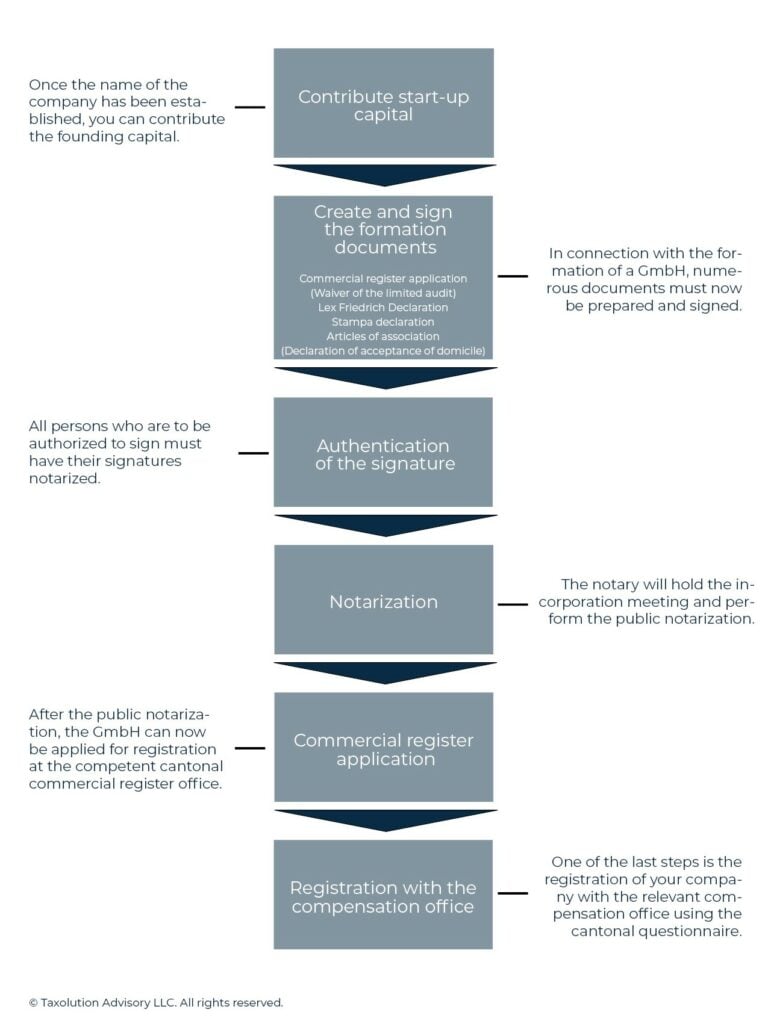Company Incorporation

Setting up a Company in Switzerland: 5 Steps to Your Own Business
In contrast to other countries, setting up a company in Switzerland is very easy, because the effort and the official procedures are kept within limits. We will show you how the formation of a company in Switzerland works and what you need to pay attention to so that you can start your own business as soon as possible.
1. Clarify Right of Residence
Before you can establish a company in Switzerland as a foreigner, you must clarify whether you are fundamentally entitled to do so. The Swiss authorities distinguish between two cases.
Persons From the EU/EFTA Area
Although Switzerland is not a member state of the EU, EU/EFTA area citizens enjoy the free movement of persons. This means that they are allowed to live, work and also establish companies in Switzerland.
Persons From Third Countries
Citizens from so-called third countries who do not yet have a residence permit (B permit) have a more difficult time setting up a company, but this is not impossible either.
To do this, you must present yourself to the competent cantonal authority and explain why you want to establish a company in Switzerland. Particular emphasis is placed on the following points:
- Companies With Positive Impact on Swiss Labor Market
Your company must create added value in the region and industry where you want to locate it. This means that jobs should be created for Swiss citizens, investments made and orders generated for the Swiss economy.
- Business Plan of Your Company
In order to credibly demonstrate that your company meets the above criteria, you should submit a detailed business plan to the authorities.
If the authorities approve your application, you will receive either a short-term residence permit for third-country nationals (permit L) or a residence permit (permit B).
2. Determine the Legal Form of the Company
It is up to you which legal form you choose for your company. Before you choose one, familiarize yourself with the legal and tax aspects.
AG or GmbH
The two most popular forms are the AG (joint stock company) and the GmbH (limited liability company). The following table compares the respective characteristics:
| GmbH | AG | |
| Minimum Capital | CHF 20,000, fully paid up (paid in) | CHF 100,000, min. CHF 50,000 paid up |
| Minimum Nominal Value | min. CHF 100 per ordinary share | at least 1 centime per share |
| Anonymity | Entry of the shareholders in the commercial register with name, residence and value of the ordinary shares | Entry in the commercial register, but no publication of investor and shareholder details |
The advantage of the GmbH is that relatively little start-up capital is required and liability is limited. It should be noted, however, that depending on the structure of the articles of association (regulations laid down by the shareholders for the GmbH), the shareholders may be obliged to make additional contributions.
The advantage of the AG is that it can be founded anonymously, while here, too, liability is limited and the company shares (stocks) can be transferred to other persons more easily than the ordinary shares of the GmbH. Anonymously in the sense here means that the single shareholders of an AG are not published in the commercial register. However, in case you are member of the board of directors and/or you have a signature right, then your name is also published.
As a beneficial owner of a share either in a GmbH or an AG, you have to disclose your share as well as any income thereof in your annual tax return.
Sole Proprietorship
It is also possible to establish a partnership in the form of a sole proprietorship. In this case, no minimum capital is required for the foundation, but the owner is liable with his private assets.
If the annual turnover is higher than CHF 100,000, the company must also be entered in the commercial register.
Activities That Are Subject to Authorisation
Certain industries have addition requirements:
– formal diploma or education (e.g. lawyer, notary public, certain activities in human health, education, sports or construction)
– increased minimal standards for their organisation or minimum capital (e.g. banks, insurance companies)
Make sure you meet those requirements before you start your business. Lacking of authorisation might lead to penalties and/or forced closure of your activity.
3. Identify Mandatory Insurances
Depending on the legal form of your company, the social insurances you have to participate in or take out for yourself and for your employees differ.
In addition, depending on the industry, there are also business insurances, e.g. business liability insurance. These are not always mandatory. Here you must weigh up whether and which you need for your area of activity.
Social Insurances for Sole Proprietorships
Founders of sole proprietorships are considered self-employed. For social insurance purposes, this means that in this case you are completely responsible for your own pension provision.
Self-employed persons are obliged to pay contributions to the 1st pillar insurances: AHV/IV (old-age and survivors’ insurance, disability insurance).
Self-employed persons cannot be insured under unemployment insurance.
Self-employed persons can take out voluntary insurance in the 2nd pillar (occupational pension plan) and in the 3rd pillar (private pension plan).
Social Insurance for Corporations (GmbH and AG)
If you own a corporation, you are your own employee as an entrepreneur. From the point of view of social insurances, you are therefore a dependent employee. This means that all social insurances under the 3-pillar model are mandatory for you and your employees. These insurances include:
- Unemployment insurance
- Pension and survivors’ insurance
- Disability insurance
- occupational benefit plan
- Health insurance
4. Determine Taxation of the Company
The taxation of the company also depends on its legal form. The tax system in Switzerland is three-layered: the federal government, the canton and the municipalities levy taxes. The tax laws and thus also the tax burden vary from canton to canton. Cantonal taxes include, for example, income tax, wealth tax, inheritance tax, capital tax and real estate tax.
Tip: If you are flexible in choosing the location of your company, compare the taxation of your company in the individual cantons before setting up. In this way, you will find out where it is most favourable for you from a tax perspective to locate your company.
Direct Taxes for Companies
Direct taxes are levied by the federal government, the canton and the municipality. Depending on the legal form, a distinction is made as to what the tax is based on:
For Sole Proprietorships
Sole proprietorships are not legal entities. Therefore, taxation is applied to the individual person, i.e. the income you earn and the assets you own are taxed according to the respective cantonal income and wealth tax rates.
For Corporations (GmbH and AG)
Both the GmbH and the AG are legal entities. With these, taxes are levied on the profit and the capital.
The federal profit tax amounts to 8.5% of the net profit. The capital tax is levied by the canton or municipality and therefore varies from canton to canton due to the different tax laws.
Indirect Taxes for Companies: Value Added Tax
Indirect taxes are levied exclusively by the federal government. These include, for example, customs duties and value added tax. Especially in the case of value added tax, there are some things to consider that may be relevant for you as an entrepreneur. Therefore, we will deal with this tax separately in the following.
Value Added Tax: Obligations for Companies
In principle, every company is subject to VAT. However, whether or not this must be accounted for depends on the company’s annual turnover.
According to the VAT Act, only a company that generates more than CHF 100,000 in annual sales is required to account for VAT. The legal form of the company is irrelevant.
You have the obligation to report your tax liability to the Federal Tax Administration within 30 days, without being asked, as soon as you achieve an annual turnover exceeding CHF 100,000.
5. Fund It, Create Documentation and Have It Certified
Once you have decided what form of business you want to set up and what rights and obligations come with it, you can now get down to the nitty-gritty.
Depending on the legal form chosen, documentation must then be prepared for and certified by the notary so that you can incorporate the company.
The following steps must be followed when establishing a GmbH:
Contribute Start-up Capital
Once the name of the company has been established, you can contribute the founding capital. If the capital is paid in cash, you need a capital contribution confirmation from the bank where the capital was deposited.
If the capital is not paid in cash but in kind (contribution in kind), you need an auditor to check and confirm the value of the assets.
Create and Sign the Formation Documents
In connection with the formation of a GmbH, numerous documents must now be prepared and signed.
Commercial Register Application
In the commercial register application, all the data that is to be published in the register is filed. These are the company name, the registered office, the domicile, the purpose as well as the persons with their participations and functions.
Waiver of the Limited Audit
Companies that do not meet the requirements for the obligation to have a regular audit in the sense of Art. 727 CO and do not have more than 10 full-time employees on an annual average can unanimously waive a limited audit in the sense of Art. 727a para. 2 CO.
Lex Friedrich Declaration
Since persons abroad require a permit from the competent cantonal authority for the acquisition of real estate, this document must declare whether foreign persons have an interest in the limited liability company.
Stampa Declaration
This declaration is concerned with ensuring that all contributions in kind and acquisitions in kind as well as intended acquisitions in kind and founder’s benefits are declared and registered at the time of formation.
Articles of Association
The limited liability company needs articles of association in which the basic legal norms are regulated, which the company gives itself.
Declaration of Acceptance of Domicile
The declaration of acceptance of domicile confirms that a possible address can be used as a c/o address.
Authentication of the Signature
In connection with the formation of the GmbH, all persons who are to be authorized to sign must have their signatures notarized. Depending on the canton, the signature can be certified at the municipal office, the commercial registry office or at a notary public. However, you do not necessarily have to be in Switzerland to have your signature notarized. This can also be done abroad without any problems, either with an apostille or an over-certification.
Notarization
Now you have all the documents and can make an appointment with the notary. The notary will then hold the incorporation meeting and perform the public notarization. If no appointment can be found that suits all shareholders and the notary, shareholders can also be represented by other shareholders. In this case, the shareholder who is prevented from attending must issue a power of attorney for the formation of the company to the shareholder attending the formation meeting.
Commercial Register Application
After the public notarization at the notary public’s office, the GmbH can now be applied for registration at the competent cantonal commercial register office. Normally, the commercial registry office now needs approx. 2 to 3 weeks until the entry is published in the commercial register.
Registration With the Competent Compensation Office
After publication in the commercial register, you must register your company with the relevant compensation office using the cantonal questionnaire
The company is established. Congratulations!
We offer different packages for startups and small businesses. The spectrum ranges from company incorporation to payroll and accounting. After you have contacted us with your non-binding request, we will calculate the service complexity and consequently determine the price. All our corporate clients receive personalized packages, which are put together in consultation with the client.



